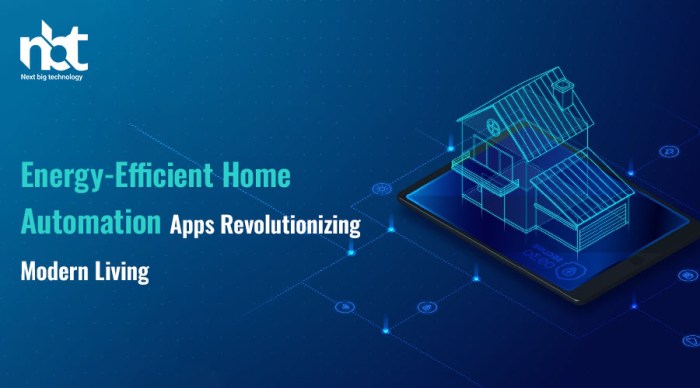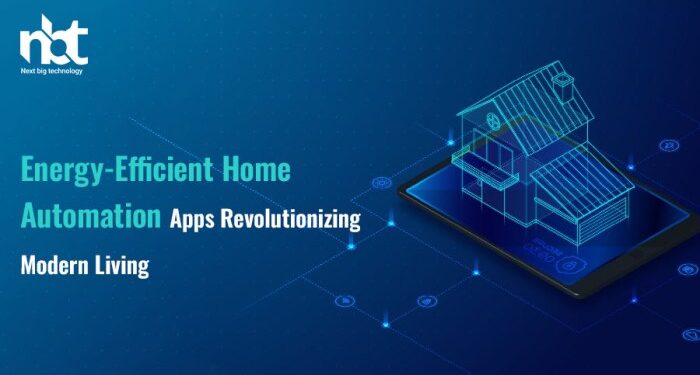Kicking off with The Benefits of Combining Home Automation with Energy Efficiency, this introduction delves into the relationship between home automation and energy efficiency. It explores how these two concepts work together to promote sustainable living and a more environmentally friendly lifestyle.
Introduction to Home Automation and Energy Efficiency
Home automation refers to the use of smart devices and systems to control various aspects of a home, such as lighting, heating, and appliances, in an automated and efficient manner. When combined with energy efficiency measures, home automation can help reduce energy consumption and promote sustainable living.
Examples of Common Home Automation Devices
- Smart thermostats: These devices can adjust the temperature settings based on your preferences and schedule, optimizing energy usage.
- Smart lighting systems: These systems allow you to control the lighting in your home remotely and set schedules to minimize energy waste.
- Smart plugs: By using smart plugs, you can monitor and control the power usage of your appliances, turning them off when not in use.
The Importance of Combining Home Automation with Energy Efficiency
By integrating energy-efficient practices with home automation technology, homeowners can significantly reduce their energy bills and carbon footprint. This synergy promotes a more sustainable lifestyle and helps create a greener environment for future generations.
Advantages of Integrating Home Automation with Energy Efficiency
Smart home automation offers a multitude of benefits when it comes to energy efficiency. By combining these two aspects, homeowners can not only save on utility bills but also contribute positively to the environment.
Reducing Energy Consumption through Automation
One of the primary advantages of integrating home automation with energy efficiency is the ability to reduce energy consumption. Smart devices such as smart thermostats, smart lighting systems, and energy-efficient appliances can be programmed to operate only when needed, optimizing energy usage throughout the home.
Optimizing Energy Usage with Smart Thermostats
Smart thermostats play a crucial role in managing energy consumption by adjusting heating and cooling settings based on occupancy patterns and preferences. By learning the household's schedule and adjusting temperatures accordingly, smart thermostats can help reduce energy waste and lower utility bills.
Positive Impact on the Environment
Using energy-efficient smart home devices not only benefits homeowners but also has a positive impact on the environment. By reducing energy consumption and lowering carbon emissions, integrating home automation with energy efficiency contributes to a greener and more sustainable lifestyle.
Energy Saving Tips with Home Automation
When it comes to energy efficiency, home automation plays a crucial role in helping homeowners save on their energy bills. By utilizing smart technology, it becomes easier to regulate lighting, heating, and cooling systems, ultimately leading to significant energy savings.
Regulating Lighting with Automation
- Smart lighting systems can adjust brightness levels based on natural light availability and occupancy, reducing unnecessary energy consumption.
- Timers and motion sensors can automatically turn off lights in unoccupied rooms, preventing wastage.
- Dimmers can be programmed to set the mood and save energy by reducing the intensity of light when full brightness is not required.
Monitoring and Controlling Energy Usage with Smart Plugs
- Smart plugs enable users to monitor energy consumption of connected devices and appliances in real-time.
- They allow for remote control, turning off devices when not in use to prevent standby power consumption.
- Integration with automation systems can schedule the operation of appliances during off-peak hours, optimizing energy usage.
Scheduling and Automation Features for Energy Efficiency
- Programmable thermostats can adjust heating and cooling based on occupancy patterns, ensuring comfort while saving energy.
- Automated blinds or curtains can regulate natural light, reducing the need for artificial lighting during daylight hours.
- Scheduling appliances to run during low-demand periods can take advantage of cheaper electricity rates, contributing to overall energy efficiency.
Smart Home Technologies for Energy Conservation
Smart home technologies play a crucial role in enhancing energy conservation efforts. By integrating renewable energy sources, such as solar panels, with smart home systems, homeowners can significantly reduce their reliance on traditional power sources and decrease their carbon footprint.
Integration of Solar Panels with Smart Home Systems
- Solar panels can generate electricity from sunlight, providing a sustainable and eco-friendly energy source for smart homes.
- Smart home systems can be programmed to prioritize the use of solar energy, thereby reducing the consumption of grid electricity during peak hours.
- By combining solar panels with smart home automation, homeowners can maximize energy efficiency and minimize utility costs over time.
Potential of Smart Meters in Tracking and Managing Energy Consumption
- Smart meters offer real-time data on energy usage, allowing homeowners to monitor and adjust their consumption patterns accordingly.
- By analyzing detailed energy data provided by smart meters, homeowners can identify areas where energy wastage occurs and take corrective actions to optimize efficiency.
- Integration of smart meters with smart home systems enables automatic adjustments based on energy consumption patterns, leading to further energy savings.
Examples of AI-Powered Systems Optimizing Energy Efficiency
- AI-powered systems can learn household habits and preferences to optimize energy usage, such as adjusting thermostat settings based on occupancy patterns.
- Smart home devices equipped with AI technology can predict energy demand and supply, allowing for better management of energy resources and reducing overall consumption.
- Integration of AI algorithms in smart home systems can continuously analyze and fine-tune energy consumption, leading to enhanced energy efficiency and cost savings.
Epilogue

In conclusion, the combination of home automation and energy efficiency offers a range of advantages that not only benefit homeowners but also contribute to a greener planet. By integrating smart technologies into our homes, we can make a positive impact on our energy consumption and overall environmental footprint.
Helpful Answers
How can home automation devices help save energy?
Home automation devices like smart thermostats, smart plugs, and automated lighting systems can regulate energy usage more efficiently, leading to energy savings.
What benefits do smart thermostats offer in terms of energy efficiency?
Smart thermostats can optimize energy usage by adjusting temperatures based on occupancy patterns and can significantly reduce utility bills.
How do AI-powered systems contribute to energy efficiency in a smart home?
AI-powered systems analyze data to optimize energy consumption, leading to more efficient use of resources and reduced energy waste.







